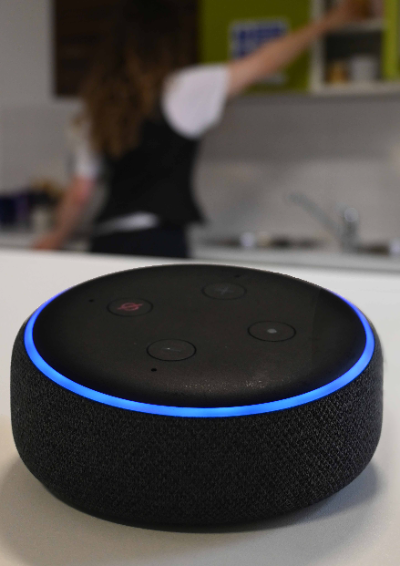Digital voice assistants
“As a severely visually impaired person, there was always a nagging sense of exposure that I was having to share too many private aspects of my life or have lots of messy adaptations in place at home or at work, which gave people the opportunity to create a negative impression of my capability.”
Paul Arnold, Deputy Chief Executive at the Information Commissioner’s Office.
 Not so long ago, communicating online meant reading and typing messages. Playing your favourite album would involve searching through your CD (or record) collection. Ordering your favourite products saw you hitting the high street or opening your phone’s browser. Today all of the above, and much more, can be done simply by speaking to a voice assistant on your phone, like Siri, or a smart speaker, like an Alexa. These may seem trivial developments to some people, but they can be gamechangers for others.
Not so long ago, communicating online meant reading and typing messages. Playing your favourite album would involve searching through your CD (or record) collection. Ordering your favourite products saw you hitting the high street or opening your phone’s browser. Today all of the above, and much more, can be done simply by speaking to a voice assistant on your phone, like Siri, or a smart speaker, like an Alexa. These may seem trivial developments to some people, but they can be gamechangers for others.
Questions have rightly been asked about how much of our personal information these devices can access. However, with appropriate safeguards in place, voice assistants can greatly benefit our lives.
Not everyone can get the same level of benefit from the internet, but voice assistants change how we interact with the technology all around us to speed up tasks such as online research, navigation and planning our time. They have made a huge difference for people who access the online world differently to others, such as the ICO’s Paul Arnold.
Paul said: “The first 15 years or so of the internet revolution were challenging. I was working with an emerging new world that wasn’t being designed with me in mind.
“For me, the emergence of digital voice assistants is a real game changer when it comes to improving equal access to the technology we increasingly rely on to run our lives. I’ve been able to create a living and work space that increasingly responds to my voice and is even able to describe my surroundings to me. It is hugely liberating and efficient. It felt like a path to regaining control over my personal information and space. I believe we are only scratching the surface of the potential applications for digital voice assistants.”